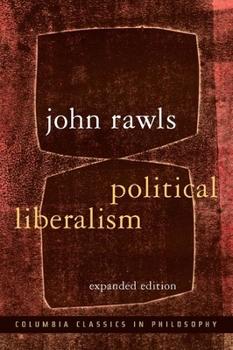Book Overview
This book continues and revises the ideas of justice as fairness that John Rawls presented in A Theory of Justice but changes its philosophical interpretation in a fundamental way. That previous work assumed what Rawls calls a "well-ordered society," one that is stable and relatively homogenous in its basic moral beliefs and in which there is broad agreement about what constitutes the good life. Yet in modern democratic society a plurality...
Format:Paperback
Language:English
ISBN:0231130899
ISBN13:9780231130899
Release Date:March 2005
Publisher:Columbia University Press
Length:576 Pages
Weight:1.80 lbs.
Dimensions:1.3" x 5.9" x 8.9"
Age Range:22 years and up
Grade Range:Postsecondary and higher
Customer Reviews
5 ratings
Must read for Poli Sci
Published by Thriftbooks.com User , 14 years ago
Rawl's focuses on his definition of a "well-ordered" society and rules... good read for a different view point on justice.
A final Revision
Published by Thriftbooks.com User , 17 years ago
Rawls has finally brought his powerful project of sociological and political philosophy to a conclusion with insights he may not have expected when he first published Political Liberalism in 1993. The inclusion of his 'Reply to Habermas', after my having also read Habermas' critique, helped him and specially me to understand the issues raised in that exchange and to enjoy following them. The inclusion also of 'The Idea of Public Reason Revisited' is very worthwhile, as it maps out the amendments he had started to make to Political Liberalism that had been cut short by his death.
A philosophical gem about public justification
Published by Thriftbooks.com User , 21 years ago
"A Theory of Justice" presented a conception of justice (justice as fairness) in the social contract tradition of Hobbes, Locke, Rousseau and Kant. In "Political Liberalism" Rawls corrects an oversight in Justice as Fairness; he attempts to apply the idea of toleration to political philosophy by recognizing the fact of reasonable pluralism. Caution: Meant only for those who wish to understand political philosophy.
Masterfully Constructed
Published by Thriftbooks.com User , 23 years ago
Rawl's work here takes his previous articulation of justice and places it inside the context of 'reasonable' society characterized by pluralism (i.e., various peoples who adhere to incompatible comprehensive doctrines). Their coexistence is made possible by the existence of the political 'overlapping consensus'. This entire work awed me page to page. The arguments within this book have the rare beauty of answering many of your questions as they enter your head. Such a work cannot be skimmed, but it must be perused. Even if, like myself, you are not a specialist in politics, this will be an engaging and fruitful reward if the time is taken to read it and ponder it. Rawls has created a truly wonderful contribution to civil society.
The good society
Published by Thriftbooks.com User , 23 years ago
Building upon his previous book, "A Theory of Justice", Rawls's thought evolves towards a better comprehension of society, constitutions, and what kind of institutional engineering would be able to best design a "good" (as opposed to "perfect") society. Now, Rawls has revised his previous conception of society: it is not necessary that a society is relatively homogeneous in the moral beliefs of its elements; it is sufficient that the political institutions are suitable to accomodate every line of thought that is not against the "overlapping consensus" of society. What is this? Rawls calls "overlapping consensus" those beliefs and principles about which every societal group is coincident. The most obvious is that murder is not acceptable and should be hardly punished, that people's goods have to be protected from theft, that free speech should be guaranteed, etc. The overlapping consensus is the sum of every group's own consensus, and thus it should be the core of the Constitution: the principles on which everybody, or almost everybody excluding criminals and other misfits, agree.Second, Rawls reviews his concept of the "original position". Many critics of Rawls argue that this concept is totally theoretical and impossible to achieve in practice. And they're right. This is not a manual for politicians or a book on public policy: it's pure political philosophy, and certainly of the highest sort. In the "original position", Rawls says that good constitutions and legal systems would be best accomplished by people ignorant of their position in society. For example, if you do not know what your social position will be, you better design a law that takes into account rights and benefits for people with every kind of handicap, lest you turn out to be blind, or deaf. Similarly, you wouldn't either be excessively hard on rich people, lest you turn out to be a big shareholder. If some approach like this could be reached when making laws, society would be better balanced and more just.Third, Rawls reviews and upholds his concept of "justice as fairness", the core of his previous book on this subject. To be just is to be fair. Sounds simple, but it's not always easy to determine what is fair to someone. But it implies that public policy on justice should not aim at correcting situations out of all proportion. Summing up, this is an extraordinary book, even if you feel you belong to a different school of thought. It makes you think of what kind of good society is really achievable, far from the disastrous attempts at building utopias that the XX century witnessed.





